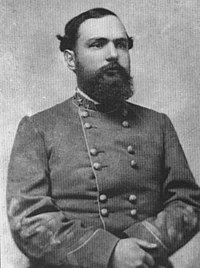William Henry Fitzhugh Lee
| William Henry Fitzhugh Lee | |
|---|---|
 |
|
| Member of the U.S. House of Representatives from Virginia's 8th district |
|
|
In office March 4, 1887 – October 15, 1891 |
|
| Preceded by | John S. Barbour, Jr. |
| Succeeded by | Elisha E. Meredith |
| Member of the Virginia Senate for Loudoun, Alexandria, Fairfax, and Prince William |
|
|
In office December 1, 1875 – December 3, 1879 |
|
| Personal details | |
| Born |
May 31, 1837 Arlington House, Virginia |
| Died | October 15, 1891 (aged 54) Alexandria, Virginia |
| Political party | Democratic |
| Spouse(s) | 1st Charlotte Wickham, 2nd Mary Tabb Bolling |
| Children | Robert Edward Lee III and George Bolling Lee (sons with Mary) |
| Alma mater | Harvard University |
| Military service | |
| Allegiance |
|
| Service/branch |
|
| Years of service | 1857–1859 (USA) 1861–1865 (CSA) |
| Rank |
|
| Commands |
|
| Battles/wars | American Civil War |
William Henry Fitzhugh Lee (May 31, 1837 – October 15, 1891), known as Rooney Lee (often spelled "Roony" among friends and family) or W.H.F. Lee, was the second son of General Robert E. Lee and Mary Anna Randolph Custis. He was a planter, a Confederate cavalry General in the American Civil War, and later a Congressman from Virginia.
Lee was born at Arlington House in Arlington, Virginia, and named for William Henry Fitzhugh, his mother's uncle. At an early age, his father began to call him Rooney; what prompted him to use this nickname is not known, but it stuck as a way to differentiate him from his cousin Fitzhugh Lee.
Rooney Lee attended Harvard University, where he befriended Henry Adams, who wrote about his relationship with Lee in chapter four of his autobiography, The Education of Henry Adams.
Lee followed in his father's footsteps after graduation, entering the United States Army in 1857 as a second lieutenant. He served with the 6th U.S. Infantry under Albert Sidney Johnston, and participated in the Utah War against the Mormons. In 1859, he resigned from the U.S. Army to operate his White House Plantation, on the south shore of the Pamunkey River, in New Kent County, Virginia.
...
Wikipedia
